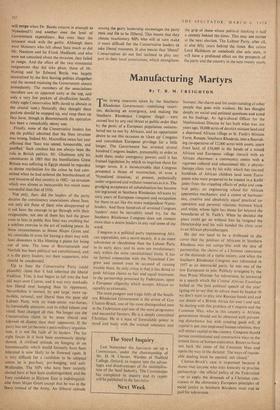Manufacturing Martyrs
By T. R. M. CREIGHTON
THE strong measures taken by the Southern Rhodesian Government—mobilising reserv- ists, declaring an emergency, and making the Southern Rhodesian Congress illegal — were caused less by any real threat to public order than by the panic of a European population outnum- bered ten to one by Africans, and an opportunist desire to use this occasion to 'clean up' Congress and consolidate European privilege for a little longer. The Government has arrested sveral hundred Congress leaders, presumably in order to hold them under emergency powers until it has framed legislation by which to imprison them for longer terms. It is inconceivable that Congress presented a threat of insurrection, or even a 'Nyasaland situation,' at present, pathetically under-organised and without resources as it is. The grudging acceptance of subordination has become too ingrained in Southern Rhodesian Africans by sixty years of European conquest and occupation for them to act like the more independent Nyasa- landers. And these hundreds of arrested Congress 'leaders' must be incredibly small fry, for the Southern Rhodesian Congress does not contain more than a dozen leaders in any real sense of the word.
Congress is a political party representing Afri- can aspirations, not a secret society. It is no more subversive or clandestine than the Labour Party in its early days, and its aims are revolutionary only within the same constitutional limits. It has no formal connection with the Nyasaland Con- gress and cannot even he accused of causing trouble there. Its only crime is that, it has dared to push African claims to fair and equal treatment, to the partnership promised by Federation, upon a European oligarchy which accepts African in- equality as axiomatic.
The most pungent and tragic folly of the South- ern Rhodesian Government is the arrest of Guy ('lutton-Brock, one of the most distinguished men in the Federation and one of the most progressive and successful farmers. He is a deeply committed Christian. He is a Tan of formidable power in mind and body with the relaxed tolerance and
humour, the charm and the understanding of other people that goes with wisdom. He has thought deeply on social and political questions and acted on his findings. As Agricultural Officer for the Mashonaland Diocese he has built what was, ten years ago, 10,000 acres of derelict mission land and a depressed African village at St. Faith's Mission Farm, Rusape, Southern Rhodesia, into a flourish- ing co-operative of 12,000 acres with assets, apart from land, of £50,000 in the hands of a mixed African and European village council with an African chairman; a community centre with a vigorous cultural and educational life; a physio- therapy clinic run by his wife, which has rescued hundreds of African children (and some Euro- peans who were prepared to be treated in a Kaffir joint) from the crippling effects of polio and cere- bral palsy; an engineering school for African apprentice mechanics; and a centre of harmoni- ous, creative and absolutely equal practical co- operation and personal relations between black and white, whose light has shone far beyond the boundaries of St. Faith's. When he decided the place could get on without him he resigned the Directorship and his wife handed the clinic over to an African physiotherapist.
He did not need to be a firebrand to dis- cover that the position of Africans in Southern Rhodesia was not compa'ihle with the idea of • partnership, the claims of a Christian conscience or the demands of a stable society, and when the Southern Rhodesian Congress was refounded in 1957 as an interracial party. he was one of the few Europeans to join. Publicly arraigned by the. then Prime Minister for subversion, he answered in a speech which the Central African Examiner hailed as 'the best political speech of the year' (going on to say that its advice must be heeded 'if- we don't want to play into Russian hands and end our dream of a British Africa for ever') and said, 'In dealing with this problem of Congress and the Common Man, who in this country is African, government should not be obsessed with prevent- ing disturbance but with creating good will.. If capital is put into improved human relations, they will attract capital to the country. Congress should Pursue constitutional and constructive ways to the utmost limits of human endurance. Resort to force sets back the cause of the Common Man and opens the way t6 the dictator. The ways of reason- able dealing must be opened. not closed.'
Clutton-Brock's case is important because it shows that anyone who tries honestly to practise partnership—the official policy of the Federation --or to apply the demands of a Christian con- science or the elementary European prindples of social justice in Southern Rhodesia must end in gaol for subversion.


































 Previous page
Previous page